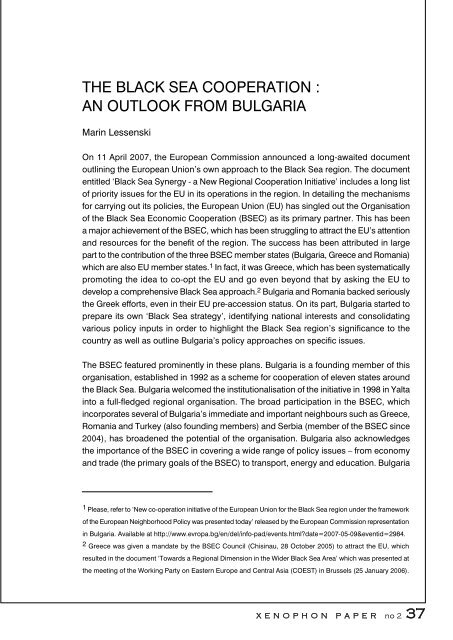Xenophon Paper 2 pdf - ICBSS
Xenophon Paper 2 pdf - ICBSS
Xenophon Paper 2 pdf - ICBSS
You also want an ePaper? Increase the reach of your titles
YUMPU automatically turns print PDFs into web optimized ePapers that Google loves.
THE BLACK SEA COOPERATION :<br />
AN OUTLOOK FROM BULGARIA<br />
Marin Lessenski<br />
On 11 April 2007, the European Commission announced a long-awaited document<br />
outlining the European Union’s own approach to the Black Sea region. The document<br />
entitled ‘Black Sea Synergy - a New Regional Cooperation Initiative’ includes a long list<br />
of priority issues for the EU in its operations in the region. In detailing the mechanisms<br />
for carrying out its policies, the European Union (EU) has singled out the Organisation<br />
of the Black Sea Economic Cooperation (BSEC) as its primary partner. This has been<br />
a major achievement of the BSEC, which has been struggling to attract the EU’s attention<br />
and resources for the benefit of the region. The success has been attributed in large<br />
part to the contribution of the three BSEC member states (Bulgaria, Greece and Romania)<br />
which are also EU member states. 1 In fact, it was Greece, which has been systematically<br />
promoting the idea to co-opt the EU and go even beyond that by asking the EU to<br />
develop a comprehensive Black Sea approach. 2 Bulgaria and Romania backed seriously<br />
the Greek efforts, even in their EU pre-accession status. On its part, Bulgaria started to<br />
prepare its own ‘Black Sea strategy’, identifying national interests and consolidating<br />
various policy inputs in order to highlight the Black Sea region’s significance to the<br />
country as well as outline Bulgaria’s policy approaches on specific issues.<br />
The BSEC featured prominently in these plans. Bulgaria is a founding member of this<br />
organisation, established in 1992 as a scheme for cooperation of eleven states around<br />
the Black Sea. Bulgaria welcomed the institutionalisation of the initiative in 1998 in Yalta<br />
into a full-fledged regional organisation. The broad participation in the BSEC, which<br />
incorporates several of Bulgaria’s immediate and important neighbours such as Greece,<br />
Romania and Turkey (also founding members) and Serbia (member of the BSEC since<br />
2004), has broadened the potential of the organisation. Bulgaria also acknowledges<br />
the importance of the BSEC in covering a wide range of policy issues – from economy<br />
and trade (the primary goals of the BSEC) to transport, energy and education. Bulgaria<br />
1 Please, refer to ‘New co-operation initiative of the European Union for the Black Sea region under the framework<br />
of the European Neighborhood Policy was presented today’ released by the European Commission representation<br />
in Bulgaria. Available at http://www.evropa.bg/en/del/info-pad/events.html?date=2007-05-09&eventid=2984.<br />
2 Greece was given a mandate by the BSEC Council (Chisinau, 28 October 2005) to attract the EU, which<br />
resulted in the document ‘Towards a Regional Dimension in the Wider Black Sea Area’ which was presented at<br />
the meeting of the Working Party on Eastern Europe and Central Asia (COEST) in Brussels (25 January 2006).<br />
X E N O P H O N P A P E R no 2 37









